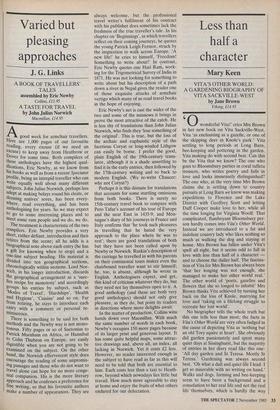Varied but pleasing approaches
J. G. Links A BOOK OF TRAVELLERS' TALES assembled by Eric Newby
Collins, £12.95
A TASTE FOR TRAVEL by John Julius Norwich
Macmillan, £14.95
Agood week for armchair travellers. Here are 1,000 pages of our favourite reading, every excuse (if we need an excuse) to keep away from Heathrow or Dover for some time. Both compilers of these anthologies have the highest qual- ifications, Eric Newby, as we know from his books as well as from a recent Spectator profile, being an intrepid traveller who can write equally well about many different subjects. John Julius Norwich, perhaps less adept at making belays round his cleats, or dressing natives' sores, has been every- where, read everything, and has been anthologising for years. So we may expect to go to some interesting places and to meet some rum people and we do, we do. The treatment is characteristic of the two Compilers. Eric Newby provides a very short, rather defiant, introduction and then retires from the scene; all he adds is a biographical note above each entry (he has a gift for knowing when to stop) and a one-line subject heading. His material is divided into ten geographical sections, chronologically within sections. Lord Nor- wich, in his longer introduction, discards the geographical arrangement as a 'sure- fire recipe for monotony' and accordingly groups his entries by subject, such as `Modes of Travel', 'Hardships', 'Health and Hygiene', 'Cuisine' and so on. Far from retiring, he stays to introduce each entry with a comment or personal re- miniscence.
There is something to be said for both methods and the Newby way is not mono- tonous. Fifty pages or so of Suetonius to Patrick tvlarnharn on Africa, or Hannibal to Colin Thubron on Europe, are easily digestible when you are not going to be examined on the subject. On the other hand, the Norwich effervescent style does encourage the reading of some unpromis- ing passages and those who do not want to travel alone can hope for no more conge- nial companion. His is the more literary approach and he confesses a preference for fine writing, so that his favourite authors make a number of appearances. They are always welcome, but the professional travel writer's fulfilment of his contract with his publisher does sometimes lack the freshness of the true traveller's tale. In his chapter on 'Beginnings', in which travellers reflect on their coming journeys, he quotes the young Patrick Leigh Fermor, struck by the inspiration to walk across Europe. 'A new life!' he cries to himself, 'Freedom! Something to write about!' In contrast, Eric Newby quotes one Hari Ram, work- ing for the Trigometrical Survey of India in 1871. He was not looking for something to write about but his description of a path down a river in Nepal gives the reader one of those exquisite attacks of armchair vertigo which many of us read travel books in the hope of enjoying.
Eric Newby's net is cast the wider of the two and some of the minnows it brings in prove the most attractive of the catch. He is less shy of translations than John Julius Norwich, who finds they 'lose something of the original'. This is true, but the loss of the archaic and euphuistic style of the facetious Coryat or long-winded Lithgow can easily be borne. I prefer the good, plain English of the 19th-century trans- lator, although it is a shade unsettling to find it in the early entries, then followed by the 17th-century writing and so back to modem English. (We re-write Chaucer: why not Coryat?) Perhaps it is this distaste for translations that accounts for some startling omissions from both books. There is surely no 15th-century travel book to compare with Pero Tafur's account of his tour of Europe and the near East in 1435-9, and Mon- taigne's diary of his journeys in France and Italy confirms that 'he took such pleasures in travelling that he hated the very approach to the place where he was to rest'; there are good translations of both but they have not been called upon by Newby or Norwich. Ruskin's description of the carriage he travelled in with his parents on their continental tours makes even the chairbound traveller want to stir himself; he, too, is absent, although he wrote in English. Anthologisers expect, and get, this kind of criticism whatever they do, but they need not lay themselves open to it. A good anthology (and these are both very good anthologies) should not only give pleasure, as they do, but point its readers in directions where more delights await.
In the matter of production, Collins wins hands down over Macmillan. With much the same number of words in each book, Newby's occupies 150 more pages because of its larger print and generous layout. It has some quite helpful maps, some attrac- tive drawings and, above all, an index, all lacking in Norwich. Yet it costs £2 less. However, no reader interested enough in the subject to have read as far as this will need to be told that both are essential to him. Each costs less than a taxi to Heath- row, beyond which nowadays lies little but travail. How much more agreeable to stay at home and enjoy the fruits of what others endured for our delectation.






















































 Previous page
Previous page